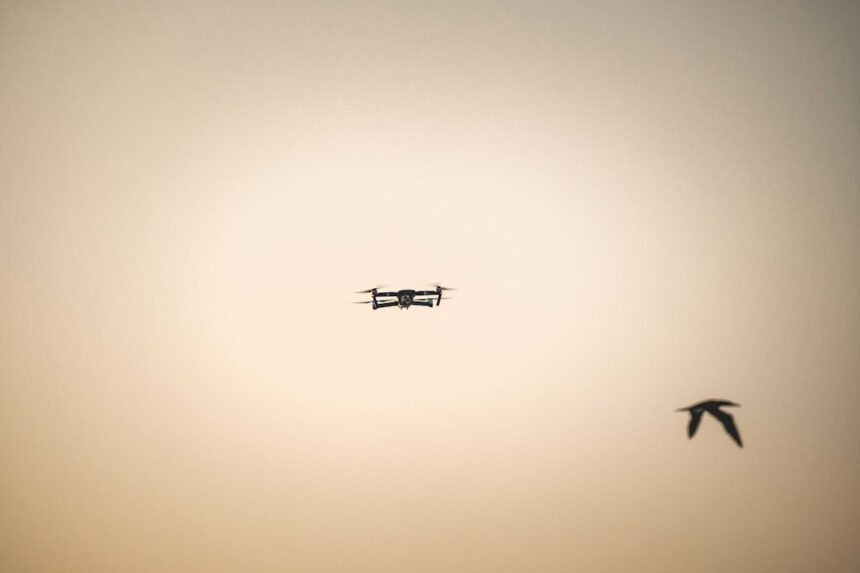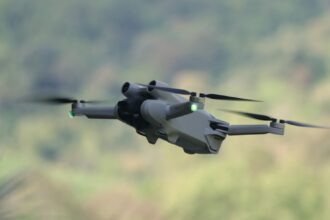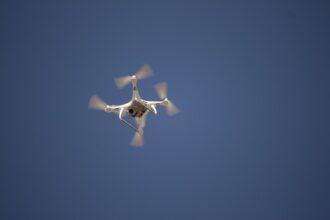Drone warfare has emerged as a significant component of modern military strategy, revolutionizing the way conflicts are conducted. The advent of unmanned aerial vehicles (UAVs) has allowed military forces to engage in combat operations with unprecedented precision and reduced risk to personnel.
This shift in warfare tactics has not only changed the battlefield dynamics but has also raised critical ethical and psychological questions regarding the impact on soldiers involved in these operations. As drone technology continues to evolve, so too does the complexity of its implications for military personnel. The detachment afforded by remote operations can lead to a unique set of challenges, particularly concerning mental health.
While drones may minimize physical danger for operators, the psychological toll of engaging in warfare from a distance is becoming increasingly evident. Understanding the nuances of drone warfare is essential for comprehending its broader effects on soldiers, especially in relation to post-traumatic stress disorder (PTSD).
Key Takeaways
- Drone warfare has become a prominent feature of modern military operations, raising concerns about its psychological impact on soldiers.
- PTSD, or post-traumatic stress disorder, is a mental health condition that can affect individuals who have experienced traumatic events, such as combat.
- Drones are increasingly used in modern warfare for surveillance, intelligence gathering, and targeted strikes, changing the nature of combat and potentially contributing to PTSD in soldiers.
- The psychological impact of drone warfare on soldiers can be significant, leading to symptoms of PTSD such as anxiety, depression, and hypervigilance.
- Factors contributing to PTSD in soldiers affected by drone warfare include the remote nature of drone operations, the detachment from direct combat, and the moral and ethical implications of drone strikes.
Understanding PTSD in Soldiers
Post-traumatic stress disorder is a mental health condition that can develop after an individual experiences or witnesses a traumatic event.
Symptoms of PTSD can manifest in various ways, including flashbacks, severe anxiety, nightmares, and uncontrollable thoughts about the traumatic experience.
The impact of PTSD can be debilitating, affecting not only the individual soldier but also their relationships and overall quality of life. The military has long recognized the prevalence of PTSD among its ranks, particularly following intense combat deployments. However, the understanding of PTSD has evolved over time, with increased awareness of its symptoms and effects.
The stigma surrounding mental health issues in the military has begun to diminish, leading to more open discussions about the challenges soldiers face. Despite this progress, many veterans still struggle to seek help due to fears of judgment or concerns about their career advancement within the military.
The Use of Drones in Modern Warfare

The integration of drones into military operations marks a significant shift in how wars are fought. Initially developed for reconnaissance purposes, drones have evolved into sophisticated platforms capable of carrying out targeted strikes with remarkable accuracy. Their ability to loiter over a battlefield for extended periods allows for real-time intelligence gathering and decision-making.
This capability has made drones an invaluable asset in counterterrorism efforts and asymmetric warfare scenarios. Moreover, the use of drones has transformed the concept of engagement in warfare. Traditional combat often involved close-quarters confrontations and direct interactions between opposing forces.
In contrast, drone operators can engage targets from a safe distance, often without ever setting foot on the battlefield. This detachment can create a sense of invulnerability among operators, but it also raises ethical concerns about the dehumanization of warfare and the potential for collateral damage.
The Psychological Impact of Drone Warfare on Soldiers
| Psychological Impact | Statistics |
|---|---|
| PTSD | 30% of drone operators experience symptoms |
| Depression | 20% of drone operators report depressive symptoms |
| Anxiety | 25% of drone operators suffer from anxiety |
| Stress | 40% of drone operators experience high levels of stress |
While drone warfare may reduce physical risks for operators, it introduces a complex array of psychological challenges. The experience of conducting strikes from afar can lead to feelings of isolation and disconnection from the realities of combat. Operators may grapple with moral dilemmas regarding their actions, particularly when civilian casualties occur as a result of their decisions.
This cognitive dissonance can contribute to feelings of guilt and shame, which are often precursors to PTSD. Furthermore, the nature of drone warfare can create a unique form of stress known as “remote warfare stress.” Operators may experience heightened anxiety due to the constant pressure to make split-second decisions that could have life-or-death consequences. The lack of immediate feedback from the battlefield can exacerbate feelings of uncertainty and helplessness.
As a result, many drone operators report experiencing symptoms similar to those seen in traditional combat veterans, including intrusive thoughts and emotional numbing.
Factors Contributing to PTSD in Soldiers
Several factors contribute to the development of PTSD among soldiers, particularly those involved in drone warfare. One significant factor is the intensity and duration of exposure to traumatic events. Soldiers who experience prolonged deployments or repeated exposure to violence are at a higher risk for developing PTSD.
Additionally, individual differences such as pre-existing mental health conditions, personality traits, and coping mechanisms play a crucial role in how soldiers respond to trauma. Another contributing factor is the social environment surrounding soldiers during and after their service. The military culture often emphasizes resilience and stoicism, which can discourage individuals from seeking help for mental health issues.
This stigma can lead to isolation and exacerbate feelings of shame or inadequacy among those struggling with PTSD. Furthermore, the lack of adequate support systems during reintegration into civilian life can hinder recovery efforts and prolong suffering.
The Role of Drone Warfare in PTSD Development

Drone warfare presents unique challenges that can exacerbate the risk of PTSD among operators. The psychological distance created by remote operations can lead to a disconnection from the consequences of their actions. While this detachment may initially seem beneficial by reducing immediate emotional responses, it can ultimately result in unresolved guilt and trauma when operators confront the realities of their decisions later on.
Moreover, the nature of drone missions often involves high-stakes scenarios where operators must make rapid decisions under pressure. This constant state of vigilance can lead to chronic stress and anxiety, which are known precursors to PTSD. The cumulative effect of these stressors can create a perfect storm for mental health issues to develop, making it imperative for military leaders to recognize and address these challenges proactively.
Coping Mechanisms for Soldiers Affected by Drone Warfare
Coping mechanisms play a vital role in how soldiers manage the psychological impact of drone warfare. Some individuals may find solace in traditional methods such as therapy or counseling, where they can process their experiences in a supportive environment. Cognitive-behavioral therapy (CBT) has shown promise in helping veterans reframe negative thought patterns associated with trauma.
Others may turn to peer support groups or veteran organizations that provide a sense of community and understanding among those who have shared similar experiences. Engaging with fellow veterans can foster connections that alleviate feelings of isolation and promote healing through shared narratives. Additionally, mindfulness practices such as meditation and yoga have gained popularity as effective tools for managing stress and anxiety among soldiers grappling with PTSD.
Addressing PTSD in Soldiers Post-Drone Warfare
Addressing PTSD in soldiers who have engaged in drone warfare requires a multifaceted approach that encompasses prevention, intervention, and ongoing support. Military leadership must prioritize mental health resources and create an environment where seeking help is normalized rather than stigmatized. Training programs that educate personnel about the signs and symptoms of PTSD can empower soldiers to recognize their struggles and seek assistance early on.
Furthermore, integrating mental health professionals into military operations can provide immediate support for those affected by trauma. Establishing confidential channels for reporting mental health concerns without fear of repercussions is essential for fostering a culture of openness within the military community. By prioritizing mental health alongside physical readiness, military organizations can better equip their personnel to navigate the challenges associated with drone warfare.
The Importance of Support Systems for Soldiers
Support systems are crucial for soldiers coping with the psychological aftermath of drone warfare. Family members, friends, and fellow service members play an integral role in providing emotional support during difficult times. Open communication within these relationships can help soldiers feel understood and validated as they navigate their experiences.
In addition to personal support networks, professional resources such as therapists and counselors trained in trauma-informed care are essential for effective recovery. Access to mental health services should be readily available and tailored to meet the unique needs of veterans who have engaged in drone operations. By fostering strong support systems both within and outside the military framework, soldiers can find pathways toward healing and resilience.
Implementing Changes in Drone Warfare to Reduce PTSD
To mitigate the psychological impact of drone warfare on soldiers, military organizations must consider implementing changes that prioritize mental health alongside operational effectiveness. This could involve revising training protocols to include comprehensive mental health education that addresses the specific challenges associated with remote operations. Additionally, creating opportunities for debriefing after missions can provide operators with a structured environment to process their experiences and emotions.
Incorporating mental health professionals into these debriefings can facilitate open discussions about trauma and coping strategies while reinforcing the importance of seeking help when needed. Moreover, fostering a culture that values emotional well-being as much as tactical proficiency is essential for reducing stigma around mental health issues within military ranks. By prioritizing mental health initiatives alongside technological advancements in drone warfare, military leaders can create a more holistic approach to soldier welfare.
Moving Forward in Addressing PTSD in Soldiers Affected by Drone Warfare
As drone warfare continues to shape modern military operations, it is imperative that attention is given to the psychological well-being of those involved in these missions. The complexities surrounding PTSD among soldiers engaged in drone warfare necessitate a comprehensive understanding of both the operational environment and its emotional ramifications. By recognizing the unique challenges posed by remote combat operations, military organizations can take proactive steps toward supporting their personnel.
Moving forward requires a commitment to fostering an environment where mental health is prioritized alongside physical readiness. By implementing changes that address the specific needs of drone operators and promoting robust support systems, military leaders can help mitigate the risk of PTSD among soldiers affected by this evolving form of warfare. Ultimately, addressing these challenges is not only essential for individual well-being but also for maintaining operational effectiveness within military ranks as they navigate an increasingly complex global landscape.
Drone warfare has become an increasingly prevalent aspect of modern military operations, raising significant concerns about its psychological impact on soldiers. The remote nature of drone operations can create a unique form of stress, potentially leading to post-traumatic stress disorder (PTSD) among operators who are often required to make life-and-death decisions from a distance. An insightful article discussing the psychological effects of drone warfare on military personnel can be found on the In The War Room website. For more information, you can read the full article by visiting In The War Room. This piece delves into the complexities of drone warfare and its implications for the mental health of those involved.
FAQs
What is drone warfare?
Drone warfare refers to the use of unmanned aerial vehicles (UAVs) to conduct military operations, including surveillance, reconnaissance, and targeted strikes.
What is PTSD?
Post-traumatic stress disorder (PTSD) is a mental health condition that can develop after a person has been exposed to a traumatic event, such as combat, natural disasters, or other life-threatening situations.
How does drone warfare impact soldiers’ mental health?
Soldiers involved in drone warfare may experience mental health issues such as PTSD due to the prolonged exposure to high-stress situations, witnessing traumatic events through drone footage, and the ethical and moral dilemmas associated with remote warfare.
What are the symptoms of PTSD in soldiers?
Symptoms of PTSD in soldiers may include flashbacks, nightmares, severe anxiety, uncontrollable thoughts about the event, emotional numbness, and difficulty sleeping or concentrating.
How is PTSD in soldiers treated?
Treatment for PTSD in soldiers may include therapy, medication, and support groups. Cognitive-behavioral therapy (CBT) and eye movement desensitization and reprocessing (EMDR) are commonly used therapeutic approaches.
Are there specific challenges in diagnosing and treating PTSD in soldiers involved in drone warfare?
Soldiers involved in drone warfare may face unique challenges in seeking treatment for PTSD, including stigma associated with mental health issues, difficulty in accessing mental health services, and the psychological impact of remote combat.



